| Gel Embellishment VS. Resin Coating |
 |
| Gel embellishment and resin coating are both techniques used to enhance and protect various surfaces, but they differ in their composition, application, and appearance. Let's review how you can select an appropriate finish for your art piece, based on the following criterias:
|
| Composition |
 |
| Gel embellishments typically involve using a thick, gel-like substance, often made from acrylic or gel-based mediums. These gels may contain additives like pigments, glitter, or other decorative elements. On the other hand, Resin coatings involve applying a liquid resin, typically epoxy or polyurethane, onto a surface. Resin coatings are usually clear but can also be tinted or contain additives for various effects.
If you're looking to add texture, dimension, and decorative elements to your surface, gel embellishment may be the better choice. Gel mediums allow for creating raised designs, textures, and patterns that can enhance the artistic appeal of your project. However, if your primary goal is to provide a glossy, smooth finish that enhances colors and provides protection, resin coating would be more suitable. Resin coatings create a clear, durable layer that adds depth and clarity to the underlying surface.
|
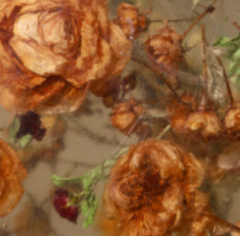
Composition
|
| Application |
 |
| Gel embellishments are often applied using brushes, palette knives, or other tools to create textures, patterns, or raised designs on surfaces like canvas, wood, or paper, while Resin coatings are poured or spread evenly over a surface and then allowed to cure. They can be self-leveling, meaning they spread out smoothly on their own, or may need to be manipulated with tools to ensure even coverage.Resin coating typically involves mixing the resin components and applying them evenly over the surface. It requires careful measurement and mixing to ensure proper curing and can involve techniques like pouring, spreading, or brushing.
|
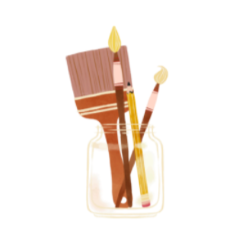
Application
|
| Appearance |
 |
| Gel embellishments can create a textured or raised surface with varying degrees of transparency or opacity, depending on the type of gel used and the application technique. They can provide a dimensional and tactile quality to the surface. Resin coatingstypically result in a glossy, smooth finish that adds depth and clarity to the underlying surface. Consider the visual effect you want to achieve. Gel embellishment can create textured, dimensional surfaces with varying degrees of transparency or opacity, offering a tactile quality to your work.
And resin coatings provide a glossy, glass-like finish that enhances colors and adds depth to the surface. They can give a professional, high-end appearance to artworks and decorative pieces.
|
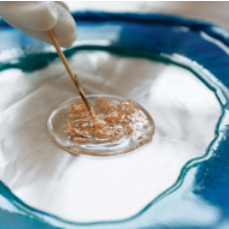
Appearance
|
| Durability and Protection |
 |
|
Gel embellishments may provide some protection to the underlying surface, but they are primarily used for decorative purposes and may not offer the same level of durability as resin coatings. Meanwhile, resin coatings form a durable and protective layer over the surface, offering resistance to scratches, moisture, and UV damage. They can prolong the lifespan of the underlying material and are commonly used for sealing artworks, countertops, and tabletops.
As you may notice so far, gel embellishment is often used for decorative purposes and adds texture and dimension to surfaces, while resin coating provides a glossy, protective finish suitable for a wide range of applications. Each technique has its own unique characteristics and is chosen based on the desired outcome and the specific requirements of the project. Ultimately, the choice between gel embellishment and resin coating depends on your specific project requirements, artistic vision, and desired outcome. You may also experiment with combining both techniques to achieve unique effects and textures in your work.
|
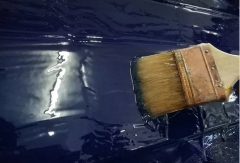
Durability
|
| What happens when you combine both: GEL EMBELLISHMENT AND RESIN? |
 |
|
Combining gel and resin on artwork can result in unique and interesting effects, blending the texture and dimension of gel embellishment with the glossy, protective finish of resin coating. Here's what happens when you combine these two techniques:
- Texture and Dimension: Gel embellishments add texture, depth, and dimension to the surface of the artwork. Depending on the type of gel used and the application technique, you can create raised designs, patterns, and textures that stand out.
- Visual Appeal: The combination of gel embellishment and resin coating can enhance the visual appeal of the artwork by adding layers of complexity. The texture provided by the gel can interact with the glossy finish of the resin, creating dynamic visual effects as light reflects off the surface.
- Protection: Resin coating provides a durable, protective layer that seals and protects the artwork from moisture, UV damage, and scratches. By applying resin over gel embellishments, you can preserve the texture and integrity of the design while also ensuring its long-term durability.
- Depth and Clarity: Resin coatings have the ability to enhance colors and patterns, giving them depth and clarity. When applied over gel embellishments, resin can magnify the colors and textures underneath, creating a vibrant and eye-catching finish.
- Technique and Application: Combining gel and resin requires careful planning and execution. You'll need to ensure that the gel embellishments are fully cured before applying the resin to avoid any unwanted reactions or interactions between the two materials. Additionally, proper preparation and application techniques are essential to achieving a smooth, bubble-free resin coating over the textured surface.
Overall, combining gel embellishment with resin coating can result in visually stunning artworks with added depth, dimension, and protection. Experimentation with different techniques and materials can lead to unique and captivating effects that showcase your creativity as an artist.
|
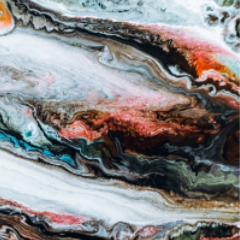
Combine
|
| Drawbacks |
 |
|
While both gel and resin offer unique benefits for artistic projects, they also have some limitations and drawbacks to consider:
Cons of Gel Embellishment:
- Limited Protection: Gel embellishments may offer some visual enhancement and texture, but they often lack the durability and protective qualities of resin coatings. They may not provide sufficient protection against moisture, UV damage, or physical wear and tear.
- Vulnerability to Damage: Depending on the type of gel used and the application technique, gel embellishments can be susceptible to damage such as cracking, chipping, or flaking over time, especially if applied on flexible surfaces.
- Longer Drying Time: Gel mediums typically have longer drying times compared to resin, which can prolong the overall project timeline. This may require patience and careful planning, especially for projects with multiple layers or intricate designs.
- Limited Transparency: Some gel mediums may have limited transparency or opacity, which can affect the final appearance of the artwork. Achieving certain effects, such as clear or glossy finishes, may be challenging with gel embellishments alone.
Cons of Resin Coating:
- Toxicity and Safety Concerns: Many resin products contain harmful chemicals and emit strong fumes during the curing process. Proper ventilation and safety precautions, such as wearing protective gear and working in a well-ventilated area, are necessary to minimize health risks.
- Mixing and Application Challenges: Resin coatings require precise measurement and mixing of resin and hardener components to achieve the desired results. Improper mixing or application can result in curing issues, such as tackiness, bubbles, or uneven coverage.
- Yellowing and Discoloration: Some resin formulations may yellow or discolor over time, especially when exposed to UV light. This can affect the appearance of the artwork, particularly if it contains light or translucent colors.
- Brittleness: While resin coatings provide a durable and protective finish, they can become brittle over time, especially in environments with temperature fluctuations. This can lead to cracking or delamination of the resin layer, compromising the integrity of the artwork.
- Cost: High-quality resin products can be expensive, especially for larger projects or multiple layers. Additionally, the investment in necessary equipment and safety gear adds to the overall cost of using resin as a coating material.
|
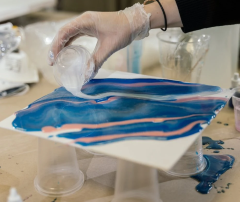
Resin Art
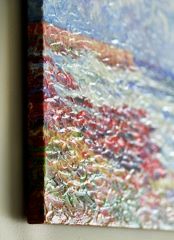
Gel Embellishment
|
| Additional Resources |
 |
|
While gel and resin offer distinct advantages for artistic projects, they also have limitations and considerations that should be weighed carefully based on the specific requirements and goals of your project.
To purchase Resin, click here!
To purchase Mediums and Gel, click here!
|

KeenART Media
|
|
If you have questions about any of our services or products, don't hesitate to contact us. Our knowledgeable staff is always happy to assist with answers, advice, or suggestions.
|
|

|



|
USA Giclee On Canvas, Fine Art Printing - Art Scanning & Reproductions - Handmade Oil Paintings - Custom Wood Panels, Metal Picture Framing - Block/Plaque Mountings, Large Format Dry Mounting & Lamination - Art Supplies: Stretcher Bars, Cradled Wood Panels and Artist Canvas - Collages On Canvas - Plexi/Acrylic Face Mounts - Block Acrylics, Fabric Printing, Dye Sublimation - Cityscape Skyline Prints, Resin, Photo Gifts and more...
|
|
© 2002-2025 - KeenART Media Ltd.
|
|
| |
|

